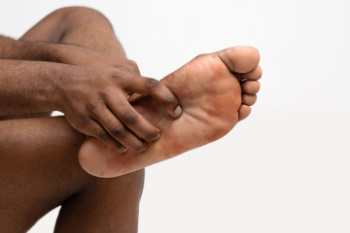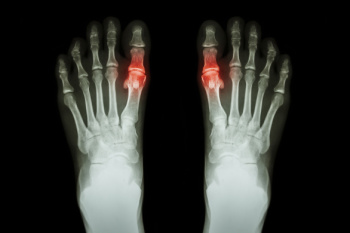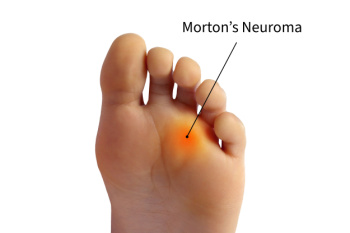Connect With Us
Blog
Items filtered by date: May 2025
It's Time for Beautiful Feet
Foot Pain While Walking

Foot pain while walking can stem from several common conditions. Plantar fasciitis causes sharp heel pain, especially in the morning, due to inflammation of the tissue that connects the heel to the toes. Morton’s neuroma involves a thickening of nerve tissue, usually between the third and fourth toes, leading to burning pain or the feeling of a pebble in the shoe. Metatarsalgia refers to pain in the ball of the foot, often caused by overuse, wearing poorly fitting shoes, or high-impact activities. These conditions may cause swelling, tenderness, or a burning or stabbing sensation. Walking can become difficult, and symptoms may worsen over time without treatment. A podiatrist can help by diagnosing the exact cause through physical exams and imaging. Treatment includes custom orthotics, targeted exercises, footwear changes, medications, corticosteroid injections, or, in some cases, surgery. If you are experiencing foot pain while walking, it is suggested that you schedule an appointment with a podiatrist for appropriate treatment.
Foot Pain
Foot pain can be extremely painful and debilitating. If you have a foot pain, consult with Deann Hofer Ogilvie, DPM from Ascend Foot & Ankle Center. Our practitioner will assess your condition and provide you with quality foot and ankle treatment.
Causes
Foot pain is a very broad condition that could be caused by one or more ailments. The most common include:
- Bunions
- Hammertoes
- Plantar Fasciitis
- Bone Spurs
- Corns
- Tarsal Tunnel Syndrome
- Ingrown Toenails
- Arthritis (such as Gout, Rheumatoid, and Osteoarthritis)
- Flat Feet
- Injury (from stress fractures, broken toe, foot, ankle, Achilles tendon ruptures, and sprains)
- And more
Diagnosis
To figure out the cause of foot pain, podiatrists utilize several different methods. This can range from simple visual inspections and sensation tests to X-rays and MRI scans. Prior medical history, family medical history, and any recent physical traumatic events will all be taken into consideration for a proper diagnosis.
Treatment
Treatment depends upon the cause of the foot pain. Whether it is resting, staying off the foot, or having surgery; podiatrists have a number of treatment options available for foot pain.
If you have any questions, please feel free to contact our office located in Lafayette, CO . We offer the newest diagnostic and treatment technologies for all your foot care needs.
Understanding Chronic Plantar Fasciitis

Chronic plantar fasciitis is a common cause of heel pain, especially in active individuals. It occurs when the plantar fascia, a thick band of tissue that runs along the bottom of the foot, becomes inflamed due to repetitive stress or strain. Common causes include overuse, wearing improper footwear, high-impact activities, or an abnormal gait. Symptoms typically include sharp or stabbing pain in the heel, particularly with the first steps in the morning or after prolonged rest. The pain may subside during the day, but can return after standing or walking for long periods. A podiatrist can diagnose chronic plantar fasciitis through physical exams and imaging tests. Treatment options include custom orthotics to support the arch, targeted exercises to stretch and strengthen the foot, and anti-inflammatory medication. In more severe cases, injections or even surgery may be necessary. If you have developed plantar fasciitis, it is suggested that you schedule an appointment with a podiatrist for appropriate treatment.
Plantar fasciitis can be very painful and inconvenient. If you are experiencing heel pain or symptoms of plantar fasciitis, contact Deann Hofer Ogilvie, DPM from Ascend Foot & Ankle Center. Our practitioner can provide the care you need to keep you pain-free and on your feet.
What Is Plantar Fasciitis?
Plantar fasciitis is the inflammation of the thick band of tissue that runs along the bottom of your foot, known as the plantar fascia, and causes mild to severe heel pain.
What Causes Plantar Fasciitis?
- Excessive running
- Non-supportive shoes
- Overpronation
- Repeated stretching and tearing of the plantar fascia
How Can It Be Treated?
- Conservative measures – anti-inflammatories, ice packs, stretching exercises, physical therapy, orthotic devices
- Shockwave therapy – sound waves are sent to the affected area to facilitate healing and are usually used for chronic cases of plantar fasciitis
- Surgery – usually only used as a last resort when all else fails. The plantar fascia can be surgically detached from the heel
While very treatable, plantar fasciitis is definitely not something that should be ignored. Especially in severe cases, speaking to your doctor right away is highly recommended to avoid complications and severe heel pain. Your podiatrist can work with you to provide the appropriate treatment options tailored to your condition.
If you have any questions please feel free to contact our office located in Lafayette, CO . We offer the newest diagnostic and treatment technologies for all your foot and ankle needs.
Facts About Gout

Gout is a form of inflammatory arthritis caused by a buildup of uric acid crystals in the joints. This condition often leads to sudden, intense pain, swelling, redness, and warmth, most commonly affecting the big toe. The pain can possibly cause difficulty in walking. Gout develops when the body either produces too much uric acid or fails to eliminate enough of it through the kidneys. Risk factors include a diet high in red meat, seafood, and sugary drinks, as well as excessive alcohol consumption. Being overweight or having certain health conditions, such as high blood pressure, diabetes, or kidney disease, can also increase the risk. Genetics can play a role, as well. If you have symptoms of gout, it is strongly suggested that you are under the care of a podiatrist who can accurately diagnose and manage this painful condition.
Gout is a painful condition that can be treated. If you are seeking treatment, contact Deann Hofer Ogilvie, DPM from Ascend Foot & Ankle Center. Our practitioner will treat your foot and ankle needs.
What Is Gout?
Gout is a form of arthritis that is characterized by sudden, severe attacks of pain, redness, and tenderness in the joints. The condition usually affects the joint at the base of the big toe. A gout attack can occur at any random time, such as the middle of the night while you are asleep.
Symptoms
- Intense Joint Pain - Usually around the large joint of your big toe, and it most severe within the first four to twelve hours
- Lingering Discomfort - Joint discomfort may last from a few days to a few weeks
- Inflammation and Redness -Affected joints may become swollen, tender, warm and red
- Limited Range of Motion - May experience a decrease in joint mobility
Risk Factors
- Genetics - If family members have gout, you’re more likely to have it
- Medications - Diuretic medications can raise uric acid levels
- Gender/Age - Gout is more common in men until the age of 60. It is believed that estrogen protects women until that point
- Diet - Eating red meat and shellfish increases your risk
- Alcohol - Having more than two alcoholic drinks per day increases your risk
- Obesity - Obese people are at a higher risk for gout
Prior to visiting your podiatrist to receive treatment for gout, there are a few things you should do beforehand. If you have gout you should write down your symptoms--including when they started and how often you experience them, important medical information you may have, and any questions you may have. Writing down these three things will help your podiatrist in assessing your specific situation so that he or she may provide the best route of treatment for you.
If you have any questions, please feel free to contact our office located in Lafayette, CO . We offer the newest diagnostic and treatment technologies for all your foot care needs.
Is It Morton’s Neuroma?

Morton's neuroma is a painful foot condition, where a nerve between the toes becomes thickened and inflamed. Morton’s neuroma often causes a burning sensation, tingling, or a feeling of a lump in the ball of the foot. This condition is commonly triggered by wearing tight shoes or high heels, or by repetitive stress on the foot. Initial treatment focuses on relieving pressure on the nerve by switching to wider, more supportive footwear, and using orthotic inserts to distribute pressure more evenly. Taking anti-inflammatory medication can help manage pain and swelling. For persistent cases, corticosteroid injections or targeted exercises may be recommended to reduce symptoms. In severe situations, surgery might be considered to remove the affected nerve. If you suspect you have Morton's neuroma or are struggling with persistent foot pain, it is suggested that you schedule an appointment with a podiatrist who can provide specialized treatment tailored to your needs.
Morton’s neuroma is a very uncomfortable condition to live with. If you think you have Morton’s neuroma, contact Deann Hofer Ogilvie, DPM of Ascend Foot & Ankle Center. Our practitioner will attend to all of your foot care needs and answer any of your related questions.
Morton’s Neuroma
Morton's neuroma is a painful foot condition that commonly affects the areas between the second and third or third and fourth toe, although other areas of the foot are also susceptible. Morton’s neuroma is caused by an inflamed nerve in the foot that is being squeezed and aggravated by surrounding bones.
What Increases the Chances of Having Morton’s Neuroma?
- Ill-fitting high heels or shoes that add pressure to the toe or foot
- Jogging, running or any sport that involves constant impact to the foot
- Flat feet, bunions, and any other foot deformities
Morton’s neuroma is a very treatable condition. Orthotics and shoe inserts can often be used to alleviate the pain on the forefront of the feet. In more severe cases, corticosteroids can also be prescribed. In order to figure out the best treatment for your neuroma, it’s recommended to seek the care of a podiatrist who can diagnose your condition and provide different treatment options.
If you have any questions, please feel free to contact our office located in Lafayette, CO . We offer the newest diagnostic and treatment technologies for all your foot care needs.

